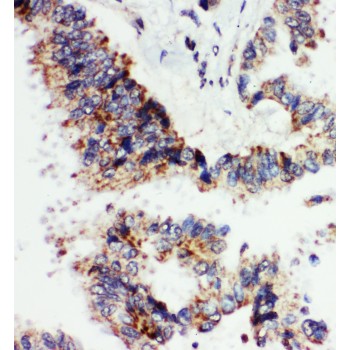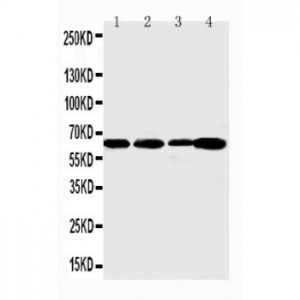More info
Overview
Long Name | Antibody Type | Antibody Isotype | Host | Species Reactivity | Validated Applications | Purification |
| angiopoietin 1 | Polyclonal | IgG | Rabbit | Human, Mouse, Rat | ELISA, IHC-P, WB | Immunogen affinity purified. |
Immunogen | ||||||
| A synthetic peptide corresponding to a sequence in the middle region of human Angiopoietin 1(225-239aa RQTYIIQELEKQLNR), different from the related mouse and rat sequences by two amino acids. | ||||||
Properties
Form | Lyophilized |
Size | 100 µg/vial |
Contents | Antibody is lyophilized with 5 mg BSA, 0.9 mg NaCl, 0.2 mg Na2HPO4, 0.05 mg Thimerosal and 0.05 mg NaN3. *carrier free antibody available upon request. |
Concentration | Reconstitute with 0.2 mL sterile dH2O (500 µg/ml final concentration). |
Storage | At -20 °C for 12 months, as supplied. Store reconstituted antibody at 2-8 °C for one month. For long-term storage, aliquot and store at -20 °C. Avoid repeated freezing and thawing. |
Additional Information Regarding the Antigen
Gene | ANGPT1 |
Protein | Angiopoietin-1 |
Uniprot ID | Q15389 |
Function | Binds and activates TEK/TIE2 receptor by inducing its dimerization and tyrosine phosphorylation. Plays an important role in the regulation of angiogenesis, endothelial cell survival, proliferation, migration, adhesion and cell spreading, reorganization of the actin cytoskeleton, but also maintenance of vascular quiescence. Required for normal angiogenesis and heart development during embryogenesis. After birth, activates or inhibits angiogenesis, depending on the context. Inhibits angiogenesis and promotes vascular stability in quiescent vessels, where endothelial cells have tight contacts. In quiescent vessels, ANGPT1 oligomers recruit TEK to cell-cell contacts, forming complexes with TEK molecules from adjoining cells, and this leads to preferential activation of phosphatidylinositol 3-kinase and the AKT1 signaling cascades. In migrating endothelial cells that lack cell-cell adhesions, ANGT1 recruits TEK to contacts with the extracellular matrix, leading to the formation of focal adhesion complexes, activation of PTK2/FAK and of the downstream kinases MAPK1/ERK2 and MAPK3/ERK1, and ultimately to the stimulation of sprouting angiogenesis. Mediates blood vessel maturation/stability. Implicated in endothelial developmental processes later and distinct from that of VEGF. Appears to play a crucial role in mediating reciprocal interactions between the endothelium and surrounding matrix and mesenchyme. |
Tissue Specificity | |
Sub-cellular localization | Secreted. |
Sequence Similarities | Contains 1 fibrinogen C-terminal domain. |
Aliases | AGP 1 antibody|AGP1 antibody|AGPT antibody|ANG 1 antibody|ANG-1 antibody|ANG1 antibody|Angiopoietin-1 antibody|Angiopoietin1 antibody|ANGP1_HUMAN antibody|ANGPT 1 antibody|ANGPT1 antibody|KIAA0003 antibody|OTTHUMP00000227592 antibody|OTTHUMP00000227599 antibody|OTTHUMP00000227600 antibody |
Application Details
| Application | Concentration* | Species | Validated Using** |
| Western blot | 0.1-0.5μg/ml | Human, Rat Mouse | AssaySolutio's ECL kit |
| Immunohistochemistry(Paraffin-embedded Section) | 0.5-1μg/ml | Human Mouse, Rat | AssaySolutio's IHC/ICC Detection kit |
| ELISA | 0.1-0.5μg/ml | Human Mouse, Rat | Sandwich ELISA format |
AssaySolution recommends Rabbit Chemiluminescent WB Detection Kit (AKIT001B) for Western blot, and Rabbit Peroxidase IHC/ICC Detection Kit (AKIT002B) for IHC(P). *Blocking peptide can be purchased at $65. Contact us for more information

Anti-Angiopoietin 1 antibody, ASA-B0082, Western blotting
Lane 1: Rat Heart Tissue Lysate
Lane 2: Rat Brain Tissue Lysate
Lane 3: Rat Kidney Tissue Lysate
Lane 4: SMMC Cell Lysate
Lane 1: Rat Heart Tissue Lysate
Lane 2: Rat Brain Tissue Lysate
Lane 3: Rat Kidney Tissue Lysate
Lane 4: SMMC Cell Lysate

Anti-Angiopoietin 1 antibody, ASA-B0082, IHC(P)
Human Lung Cancer Tissue
Human Lung Cancer Tissue


